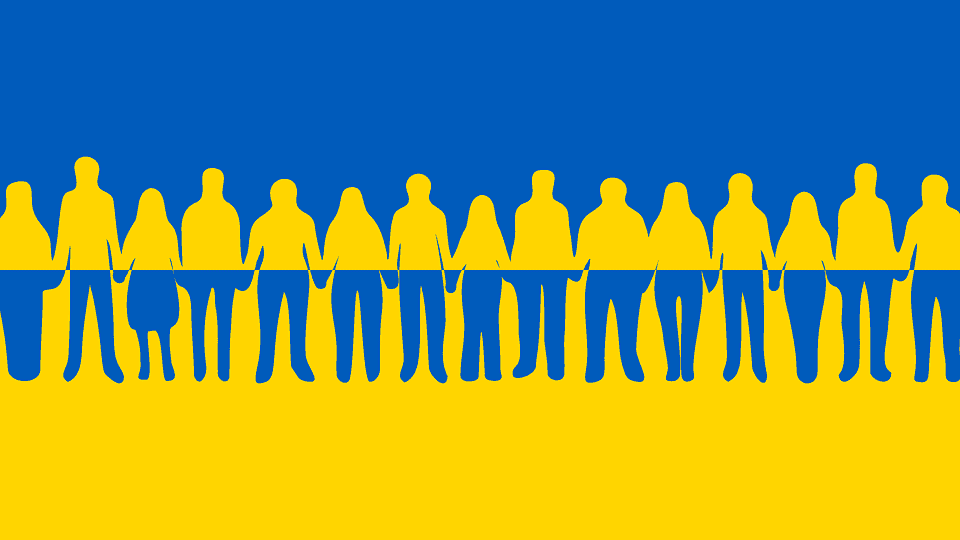Princeton University students mark anniversary of Ukraine invasion
For Princeton University freshman Sofiia Makovetska, Feb. 24, 2022 represents the dividing line of life before the war and life after the war. It was the day that Russia invaded Ukraine.
“I will never forget how at five in the morning, I woke up to my mother’s voice saying, ‘Daughter, wake up. The war has begun,’” Makovetska said.
Makovetska and her family fled Kyiv, the capital of Ukraine, the following day in what she described as the most terrifying day in her life.
She recalled seeing Russian military planes flying overhead. There were explosions. People fleeing Kyiv abandoned their cars when they ran out of gasoline. They walked with their children and baggage the rest of the way to safety, she said.
“We were lucky. We were able to leave Kyiv. Many could not,” she said, adding many have stayed in their hometowns.
Makovetska’s parents, who are physicians, returned to Kyiv in the summer to treat injured Ukrainian soldiers. When the family learned of her admission to Princeton University, “they were happy that at least one person in the family would be safe,” she said.
She was one of five Princeton University freshmen, all with Ukrainian ties, who spoke of their reactions to the invasion of Ukraine at a special event marking the one-year anniversary of the invasion. It was held in the Princeton University Chapel.
The program, entitled “365 Days of War,” was sponsored by Princeton University’s Program in Russian, Eastern European and Eurasian Studies and the Office of the Dean of Undergraduate Students.
About 200 people attended the event, scattered among the pews in the chapel. Some attendees draped the blue-and-gold Ukrainian flag around their shoulders, while others carried small Ukrainian flags.
The program was punctuated by songs, all sung in Ukrainian, by the University Chapel Choir, the Princeton University Glee Club and a small student vocal group called Princeton Decem.
Freshman Daryna Yushchenko, whose family had moved to New Jersey in 2008, had a similar experience to her classmates on the day the invasion began. She had just logged off her computer after completing her alumni interview for acceptance to Princeton University.
“A half hour later, my history teacher shares a post about Russia’s invasion. A couple minutes later, my mom comes to me – ‘Daryna, viyna pochalacia.’ The war has started,” she said.
For Yushchenko, the realization of what was happening caused her to “freeze,” she said. All she knew is that her extended family, like other Ukrainians, were living in moments “unfathomable to people who have not lived through the same,” she said.
“I remember the planning and worry that surrounded getting my grandparents out of Kyiv, to Poland and then to our house in New Jersey. I remember their stories of what they saw and the pain of what they felt,” Yushchenko said.
Yushchenko said Ukrainians did not learn how to fight over the past year. They just learned how to be better at it and learned how to vocalize it to the world. Ukrainians said, “no more silence,” she said.
“We come together today to remember. We must remember that we have hope. Our country (Ukraine) has made it clear that there is a future worth fighting for. We have and we will continue to stand with this. In the end, this hope will be our victory,” she said.
“Glory to Ukraine. Slava Ukraini,” Yushchenko said, as attendees repeated the phrase in Ukrainian.
Freshman Lianne Chomiak Chapin said she was participating in the event – not as a student from Ukraine, but as a third-generation member of the Ukrainian diaspora (population of people spread around from their original country) in the United States. Her grandparents fled Ukraine and arrived in the United States in the late 1940s.
Her grandparents never fully assimilated, and her family maintained its Ukrainian ties, Chapin said. She attended Ukrainian school on Saturdays, and traveled to Ukraine during school breaks to visit extended family and friends.
“Countless cultural events, school presentations, solidarity rallies and Ukrainian Saturday school classes later was the night of Feb. 23, 2022. I had just come back from a rally in Washington D.C. the day before encouraging U.S. policymakers to take Russia’s threats seriously,” she said.
Chapin said immediately after the invasion began, she – like most Ukrainians – got a stream of text messages asking if she was OK. She said she spent the night of Feb. 24, 2022 trying to reach relatives in Ukraine.
In the weeks and months following the Russian invasion, Chapin said, she and members of the Ukrainian diaspora worked to aid Ukrainians. For her, it meant working even more with the nonprofit charity Razom for Ukraine, an organization formed in 2014 that initiates short and long-term projects, or collaborates on existing projects with partner organizations, which help Ukraine stay on the path of fostering democracy and prosperity, according to its website.
Chapin said she tells people about the need to send F-16 fighter jets to Ukraine. She said she reminds people to contact their representatives in the U.S. Congress to designate Russia as a state sponsor of terror.
Some Congressional offices have told Razom that even four phone calls from their constituents is enough to get them to support aid bills to send weapons to Ukraine, she said.
“It is the 365th day of the invasion. We all have to keep fighting. Stay involved. Slava Ukraini (Glory to Ukraine),” Chapin said.

